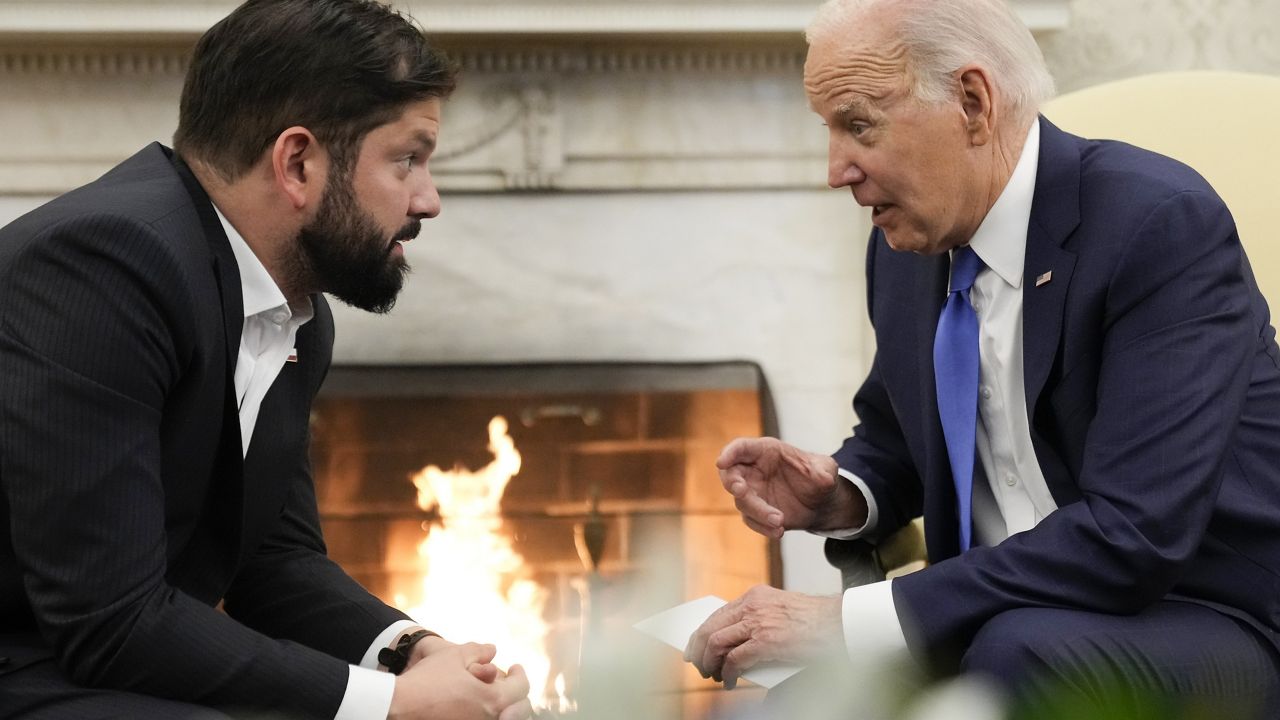Kicking off a two-day effort to make strides on migration and economic cooperation with South American and Caribbean nations, President Joe Biden hosted the presidents of Chile and the Dominican Republic for separate meetings at the White House on Thursday.
The Oval Office sit-downs come before a larger summit with leaders across the Western Hemisphere on Friday as the U.S. seeks to strengthen ties with Latin America amid China’s growing influence in the region.
At the top of his meeting with Chilean President Gabriel Boric, the president noted the U.S. and Chile were marking two centuries of diplomatic relations this year.
“Together we are working to address historic levels of migration in the hemisphere,” Biden told Boric.
Along with migration, the pair was set to discuss climate change and bolstering economic ties, with the president repurposing the phrase he frequently uses to describe his economic agenda at home: “We're going to grow the economies of the hemisphere from the bottom up and the middle out,”
“I’ve said many times that there is no reason why this hemisphere shouldn’t be the most prosperous, the most democratic hemisphere in the world. We have all the makings of that,” Biden added.
Despite the focus on the Western Hemisphere, the war in the Middle East between Israel and Hamas was likely to come up. Just this week, Chile recalled its ambassador to Israel, citing “unacceptable violations” of international law against civilians in Gaza.
Biden has been navigating what appears to be an increasingly delicate balance between emphasizing Israel’s right and obligation to defend itself while also calling for the protection of Palestinian people. This week, he called for a “pause” in the war, which White House National Security Council spokesman John Kirby later described as a chance to get in and people out.
Meanwhile, earlier in the Oval Office, Biden told the Dominican President Luis Abinader the partnership between their two countries “runs deep,” with both leaders noting the many Dominican descendants who live in the U.S.
“The partnership between our nations is, I think, stronger than ever before, in large part because of your leadership,” Biden told Abinader who later said he agreed the ties were “better than ever.”
“The Dominican people are your friends, the Dominican people are your allies and the Dominican people are your partners,” Abinader said.
Along with the economy and democratic principles, the two were also set to discuss the humanitarian and security situation in Haiti, according to the White House.
Haiti has been wrestling with escalating gang violence, resulting in increased killings, kidnappings and rapes. Haitian President Jovenel Moïse was assassinated in 2021.
Migration was expected to be top-of-mind in Biden’s meeting with Boric and during Friday’s summit as the U.S. grapples with an influx of migrants at the U.S.-Mexico border – putting the Democratic president under constant scrutiny from GOP lawmakers and some in his own party.
This week, Democratic mayors from five major U.S. cities sent a letter asking for more federal aid to address the surge and asking for a meeting with the president. A few of those mayors were in Washington on Thursday to meet with White House and Congressional leadership.
At last year’s Summit of the Americas in Los Angeles, which similarly brought together Western Hemisphere leaders, nearly two-dozen nations in the region including the U.S. and Chile agreed to a declaration on migration. The principles, which served more as a roadmap than anything else, included affirmations of the need to provide financial assistance to areas impacted by migration, collaborate on humane border management and more.
Leaders in the Western Hemisphere are also looking to build on their commitment – announced at last year’s summit in Los Angeles as well – to bolster economic cooperation in the area.
Abinader mentioned he was looking forward to hosting the Summit of the Americas in 2025, noting it will be held in Punta Cana in the Dominican Republic and telling Biden that means he will “have time to be on the beach,” with a laugh.



